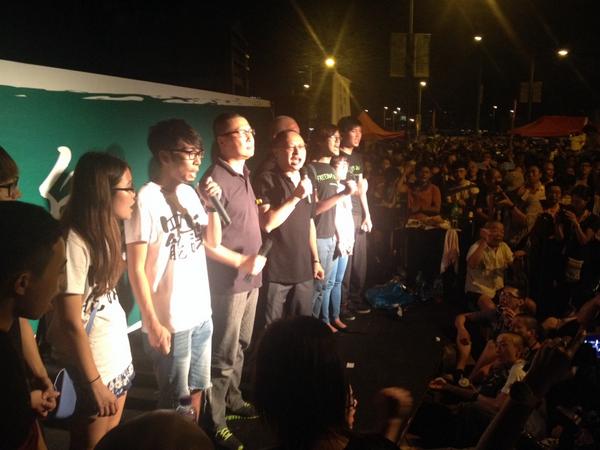[Since the rise of capitalism, it has been common for capitalist powers and allied-capitalist partners to blame internal protests, rebellions, and class struggles on external forces, always seeking to turn attention away from the miserable conditions created in those societies. And in more recent times, imperialists (and “anti-imperialists” who only oppose one side of competing imperialists) blame the instability in opposing camps on external meddling by the opposite number, whereas the meddlers usually come from all sides in proxy wars today, trying to exploit the ever-emerging resistance of oppressed and exploited people.
Today, the popular opposition in Hong Kong, which has never experienced “self-determination” (since their emergence from British colonial rule was at a time when only the arms of restored and exploitive Chinese capitalism were waiting to greet, and restrain, them–in a kind of formally-internal but neo-colonial comprador-relation) has brought unprecedented numbers into the streets.
Russia’s Putin, aligned with the Chinese capitalist-imperialist regime, is blaming the Hong Kong opposition on US meddling. Now various confused “left” forces will quote each other and support Putin’s view, and will try to make it appear that Chinese capitalist-imperialists are the victims of the US. And these new anti-US conspiratorial spinners have even claimed that the use of umbrellas in defense from pepper spray, and the use of cellphone social networking, are beyond the skills and imagination of Hong Kong youth, so they must have been instructed by the CIA! And while the US is undoubtedly encouraging its friends in Hong Kong, there is no evidence that they started this popular rebellion, or are shaping, leading, or controlling it in any way. See the following article by Dave Lindorff for another view on these rebellions.
Today, it is said that the protests are winding down. Perhaps, but it may be just getting a second wind, or summing things up in preparation for the next round of struggle. But the bottom line is, as Mao (whom China’s current rulers have worked to censor and turn into an empty icon) has said, “Wherever there is oppression, there follows resistance.” Support the struggles of the people of Hong Kong! — Frontlines ed.]
. . . . . . . . . . . . . . . . . . . . .
Has the Left Libeled a Democracy Movement?
What’s Driving the Hong Kong Protests
by DAVE LINDORFF, CounterPunch, OCTOBER 06, 2014
A number of progressive and left-leaning writers in the US have jumped on a report by Wikileaks that the neo-con dominated National Endowment for Democracy (NED) and various other US-government linked organizations with a history of subversion and sowing discord abroad are operating in Hong Kong and on that basis are making the leap of “logic” that the democracy protests in Hong Kong must therefore be a creation of US policy-makers.

Protesters take cover from pepper spray with umbrellas as riot police clash with tens ofthousands of protesters blocking the main street leading to the financial Central district outside the government headquarters in Hong Kong September 28, 2014.(Reuters / Bobby Yip)
As a progressive, Chinese-fluent journalist who has spent years working in China and especially Hong Kong, and who has spent decades exposing the secret workings of US agencies and their network of fake NGOs in support of US empire, as well as their anti-democratic activities here in the US, I can understand why people might be suspicious, but I want to explain that Hong Kong is not Ukraine or even Venezuela or Brazil.
Continue reading →












 Tempers flared and there were scenes of chaos before dawn on Saturday when protesters used umbrellas to shield themselves from the pepper spray. Those who got hit used water to rinse their eyes. “I paid my highest respect to every soldier who defends till the last moment… Civil disobedience – it continues to happen,” said student leader Lester Shum on his Facebook page.
Tempers flared and there were scenes of chaos before dawn on Saturday when protesters used umbrellas to shield themselves from the pepper spray. Those who got hit used water to rinse their eyes. “I paid my highest respect to every soldier who defends till the last moment… Civil disobedience – it continues to happen,” said student leader Lester Shum on his Facebook page.